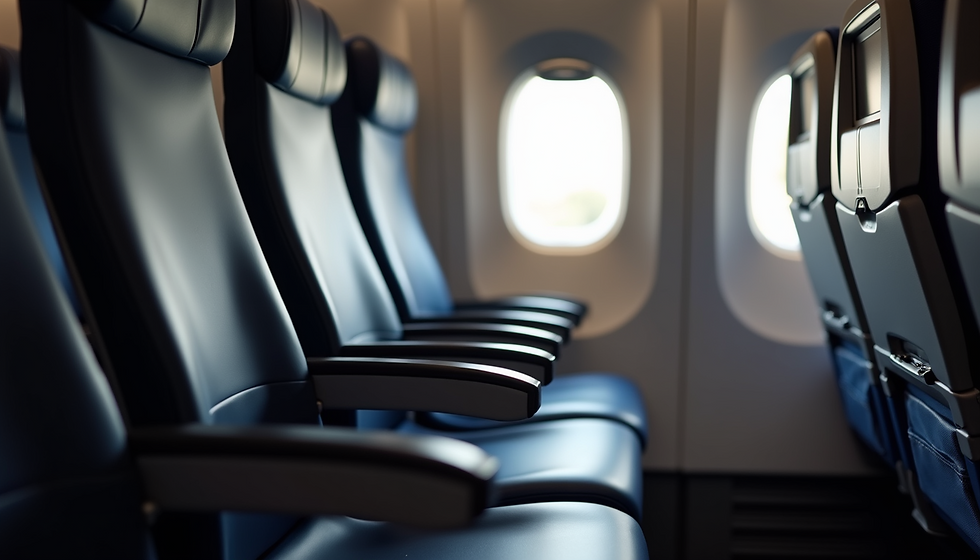Understanding and overcoming travel anxiety
- Dr Kristy Potter

- Jun 5, 2025
- 4 min read
Travelling can be one of the most exciting experiences in life, but for many people, it also brings along a heavy burden - travel anxiety. This condition can trigger feelings of fear, unease, and discomfort, making it difficult to enjoy the adventure ahead. Understanding what travel anxiety is and how to overcome it can help transform your trips from stressful to enjoyable.
What is 'travel anxiety'?
Travel anxiety refers to the feelings of stress, worry, and fear that can arise during various stages of travel. This can occur before, during, or after a trip, leading to physical and mental symptoms. Many travellers experience anxiety about flying, navigating unfamiliar places, or the possibility of things going wrong.
Some statistics suggest that about 20% of the population experiences some form of travel anxiety, with a significant number feeling intense anxiety about air travel. The symptoms can vary widely. Some may feel slight nervousness, while others may experience panic attacks characterised by shortness of breath, rapid heartbeat, and even nausea.

Causes of travel anxiety
Travel anxiety can stem from various sources. Understanding these causes is crucial for finding effective ways to manage and alleviate symptoms.
Fear of the unknown: Anxiety often arises from the unpredictable nature of travel. Being in new environments can cause discomfort and distress.
Past experiences: Previous negative travel experiences can haunt individuals, leading them to fear similar situations in the future. For instance, someone who faced turbulence during a flight may develop a fear of flying.
Generalised anxiety disorders: Those with a generalised anxiety disorder diagnosis may find these feelings amplified in travel situations. The stress of planning, packing, and the travel process can lead to overwhelming feelings.
Social pressure: Traveling can come with expectations to enjoy and be happy, making individuals feel more anxious when they don’t match those expectations.
Health concerns: Issues such as fear of catching diseases, especially in crowded places like airports or on planes, can add to anxiety.
Recognising what triggers your travel anxiety can help you develop effective coping mechanisms.
Signs of travel anxiety
Travel anxiety manifests in various ways. Individuals may experience a combination of physical and emotional symptoms. Common signs include:
Physical symptoms: Sweaty palms, rapid heartbeat, dizziness, or stomach issues can arise when anticipating travel.
Emotional symptoms: Feelings of dread, panic, or irritability before or during the journey.
Avoidance behaviours: Choosing not to travel, skipping vacations, or isolating oneself due to fear.
Sleep disturbances: Trouble sleeping the night before a trip or insomnia during travel days.
Understanding and acknowledging these signs is the first step toward managing them effectively.

Practical strategies to overcome travel anxiety
Fortunately, there are several practical strategies designed to help manage and alleviate travel anxiety.
1. Preparation is key
Being well-prepared can significantly reduce feelings of anxiety. Make checklists for packing, research your destinations, and familiarise yourself with itineraries. The more you know about your journey, the better equipped you'll feel.
2. Mindfulness techniques
Practicing mindfulness and relaxation techniques can bring you peace. Deep breathing, meditation, and yoga are excellent tools for managing stress. Techniques such as visualisation (imagining a calm place, for example) can also be powerful.
3. Graded exposure
If you find yourself feeling particularly anxious about specific aspects of travel, consider graded exposure. Start with short trips or familiar settings before progressing to longer journeys or new locations.
4. Talk it out
Sometimes, discussing your fears with a trusted friend or family member can be beneficial. They can provide support and encouragement, making your journey feel less daunting.
5. Seek professional help
If anxiety severely interferes with your ability to travel, consider speaking to a mental health therapist or psychologist. They can provide tailored strategies and techniques, including cognitive-behavioral therapy (CBT), acceptance and commitment therapy (ACT), or eye movement desensitisation and reprocessing (EMDR), which can be very effective.

Alternatives to flying
For individuals who are particularly afraid of flying, there are alternatives to flying that can alleviate travel anxiety. Consider road trips or train journeys instead. These options allow more control over your environment and may significantly reduce stress levels. However, remember, this is just a sticky plaster and don't not 'fix' the issue and may restrict you in the long term.
Additionally, embracing new modes of transportation can be an adventure in itself. Explore scenic routes or discover hidden gem destinations that are less accessible by air.
Final thoughts
Travel anxiety is a common experience, but it doesn’t have to dictate your adventures. Understanding its causes and recognising the signs can empower you to tackle it head-on. Employing techniques such as thorough preparation, mindfulness, gradual exposure, and seeking professional help can lead to enjoyable travel experiences.
Above all, remember that you're not alone in feeling this way. Many have overcome travel anxiety and found joy in exploring the world. With the right strategies, you can do the same. Take the chance, embrace new experiences, and let the world inspire you to grow beyond your comfort zone.







Comments